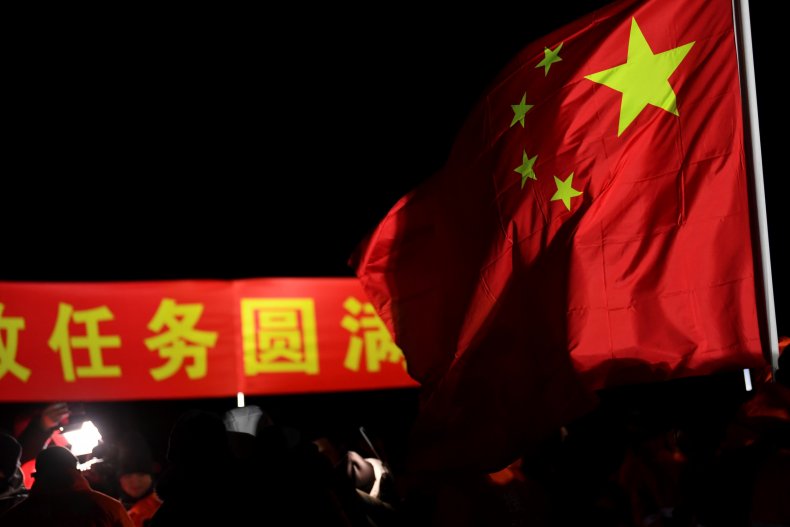China Seeks its "Suez Moment" to Seize the U.S.'s Global Standing | Opinion
President Joe Biden's defense budget proposal rightly lists deterring the People's Republic of China (PRC) as a top priority. But it will take more than a modest increase in military spending to counter China's aggressive efforts to unseat the U.S. at the head of global power.
The $753 billion Biden has earmarked for total defense spending in fiscal year 2022 reflects an increase of less than 2 percent over this year's allocation, which already is spread too thinly over multiple strategic priorities. By contrast, the PRC's military growth has outpaced that of the U.S. nearly every year for the past decade.
The Chinese government has transformed an archaic military apparatus geared for large-scale land warfare into a modern fighting force that now rivals that of the U.S. in some respects. The PRC has not quite met its goal of establishing a "world-class" military that General Secretary Xi Jinping first articulated in 2017, but it already surpasses the U.S. in shipbuilding, land-launched ballistic and cruise missiles and integrated air defense, as the Defense Department advised Congress last year.
China's military buildup reflects an increasingly aggressive military posture. The PRC's hawkish conduct was recently confirmed by Adm. Philip Davidson, the head of U.S. Indo-Pacific Command, in testimony before members of the Senate Armed Services Committee. Regarding China's expanding military footprint in Asia, Davidson said, "I worry that they're accelerating their ambitions to supplant the United States and our leadership role in the rules-based international order, which they've long said that they want to do that by 2050. I'm worried about them moving that target closer."
The Biden administration underestimates, at our collective peril, the People's Republic's global ambitions and the resources needed to thwart them. It brings to mind political scientist Graham T. Allison's theory of Thucydides's Trap, one of history's deadliest patterns: when a rising power challenges the status of a dominant power, war is the most likely result.

Moreover, the Chinese government's threat to U.S. hegemony is more nuanced than American strategists have recognized to date. Despite its military investments, China does not necessarily seek a 20th century-style arms race. It doesn't need to. PRC strategists know that America is militarily and financially overstretched, a bubble waiting to burst. Rather, China seeks to cement its global supremacy much the way the U.S. did in 1956 through its involvement in the Second Arab-Israeli war. China is looking for its own Suez Crisis moment, and this is what the U.S. must avert.
Although it had been clear from the beginning of the 20th century that the United States was the world's preeminent economic superpower, it wasn't until after World War II that America was recognized as a global military force. Even then, countries such as the United Kingdom and France were reluctant to publicly acknowledge their own declining geostrategic positions. The Suez Crisis put an end to that.
When British, French and Israeli troops attempted to regain control of the Suez Canal after the Egyptian government wrested it from the British and French company that had managed it, the U.S. demanded a ceasefire, threatening to cripple the British economy by dumping British pounds if U.K. forces didn't withdraw. The humiliating British capitulation cemented American geopolitical power. The PRC seeks a similar triumph.
How China plans to achieve such an outcome remains a mystery. China could invade Taiwan, challenging the U.S. to intervene and testing the American public's tolerance for mass casualties in defense of the small island nation. It could "accidentally" attack an American ship in the South China Sea. It could take a page from the American playbook and start divesting itself of U.S. dollars, or engage in some form of financial or cyber warfare. Or it could pursue a strategy as yet unknown.
The Biden administration must prepare for all potentialities, adjusting the American defense posture away from Cold War principles and strengthening regional alliances. The coordinated COVID-19 relief effort among our "quad" alliance partners—Japan, Australia and India—is a good first step. Finally, the U.S. government must get its fiscal and monetary house in order to make the country less vulnerable to China's attacks.
This is an urgent issue; the economic and military gaps between China and the United States are narrowing. China already outproduces the United States and is on track to become the world's largest economy within the next few years. Tossing a few more dollars into the Defense Department budget won't be enough to meet that challenge.
Todd J. Stein is a principal of Braeside Capital, L.P., a Dallas-based private investment partnership.
The views expressed in this article are the writer's own.


